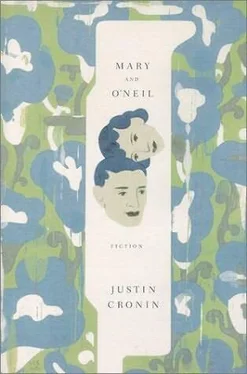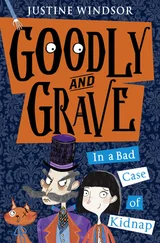His students were bright, sometimes alarmingly so. For many years O’Neil had doubted his worthiness as a teacher and waited for his fraud to be unmasked. But somehow, over time, he had come to be, he understood, beloved, a fixture of the institution and its memories. Khakis and loafers, an oxford shirt frayed at the collar and the wrists, a fifteen-year-old tie-that was his costume. His other life, his real life, was a mystery to them. Nearly every year he received a letter or postcard from a student he had taught years ago, thanking him for all he had done. He understood these letters were written in a mood of nostalgia (many began, “Today I am graduating from Harvard/Penn/Princeton/Yale…” and went on to describe some small but life-changing generosity he did not recall), and yet they touched him deeply. He kept them together in a manila folder in his desk, knowing that someday they might save him.
The Sunday after the parade his nephew Sam telephoned. O’Neil was doing an art project with Nora in the kitchen, and Mary and the baby were napping. Leah had become Leah: the nickname Roo had failed to stick.
“Mom doesn’t want you to know, but there’s something wrong.”
He gripped the phone tightly. His nephew’s voice was taut with fear; he knew the boy had been crying.
“Where are you?” O’Neil asked. A ludicrous question: the boy was many miles, and hours, away.
“I’m upstairs.” He lowered his voice to a desperate whisper. “They say it’s in her liver, O’Neil. She can’t stop throwing up.”
He thought to tell the boy to call his father, but stopped himself. “I’m coming,” he said.
He caught a plane that afternoon, arriving at the house a little after eight o’clock. It was Halloween night; all the houses on her street had decorations up. Groups of children still prowled the neighborhood, pillowcases of candy flung over their shoulders, the beams of their flashlights volleying through the trees. But Kay’s porch was barren, the lights doused. He wondered if she had taken the boys out trick-or-treating, but as he climbed the steps, the door opened to meet him. His sister stood in the doorway, bathed in darkness.
“I told him not to call,” she said and hugged him, shaking and fiercely weeping.
She fell swiftly. After Christmas, Jack moved in to look after the boys; three weeks later Kay went into the hospital, knowing she would not return. A haze of airports and rental cars: each week, O’Neil taught his classes and then caught the five o’clock plane on Friday afternoon, driving straight to the hospital in spotless, midsized American sedans that all seemed, somehow, to be the same car. Some weeks he didn’t even unpack. His lessons were scattered, but his students seemed not to know or if they did, to care. Some days he simply turned off the lights in his classroom and read to them-The Grapes of Wrath, which the ninth graders were hacking their way through like explorers in a jungle-or sent them to the library with assignments he knew he would only pretend to grade. Are you all right? they asked him, barely hiding their pleasure. What’s gotten into you, Mr. Burke? Whatever it is, they assured him, we like it. He slept fitfully or not at all, and yet his body and mind were filled with a strange energy he could not express. At lunchtime, when this internal churning became too much to bear, he put on sweatpants and went running on the paths of the sanctuary behind the campus, his mind drifting formlessly. The winter was snowless and mild; many of the trees were still dropping their leaves, though the autumn was long gone and the first of Mary’s bulbs, the crocus and hyacinth, had appeared. Had he simply failed to notice it in winters past, this anachronistic overlapping of the seasons? The woodlands where he ran were bisected by a weedy creek, and one blustery day in February he paused on the old stone bridge that crossed it, while all around him a showering of leaves, light as paper, came down. He turned his face upward and closed his eyes, receiving them. He had not been to church in years, having long forgotten how. Leaves fell on his shoulders, into his hair. Suddenly he knew that this was prayer, standing in a cathedral of falling leaves.
Later he asked a colleague, who taught science, about what he had seen.
“They’re white oaks, O’Neil,” he replied, his voice incredulous. His classroom was like a greenhouse, filled with every kind of plant. “Didn’t you know? They keep their leaves all winter.”
Weekends, he stayed at a motel on the highway that led to the hospital. Many of the other guests were there because someone they loved was dying, or so he imagined. Surely, he believed, there must be others who were living the same divided existence, one foot in each of two worlds. He spent long days at the hospital with Kay: shuttling the boys back and forth for visits, eating off a tray in the cafeteria, hoping for some glimmer of good news but knowing none would come. At night he fell into bed, exhausted but still humming with wakefulness; sometimes he would talk to Mary for hours, finally falling asleep with the telephone resting on the pillow beside him. For Simon the time was almost happy: their father was at home with them again. Noah regarded it as he regarded everything, with a vague but neutral interest; Mama was sick, Daddy was sleeping where he used to sleep, it was winter, he had to wear gloves and a hat. Sam was trying to be brave, but underneath, O’Neil felt the strain, a disturbance that rippled through his body like a flush of fever. On a Sunday in early March, O’Neil had caught him in a moment when he thought no one was watching. Sam was standing in the snowy yard; at his feet, he had built a pile of snowballs, perhaps a dozen of them, expertly spherical and perfect for throwing. As O’Neil watched from the window, Sam had hurled these snowballs one by one, as hard as he could, at the wall of the garage. The target was unmissably large; accuracy was not the point. Nor was the grace of his throw; he released each one with the full force of his entire body, nearly falling over every time. When he was through, he leaned over, his hands on his knees, panting with exertion. Then he made more snowballs and did it all again.
O’Neil waited to hear from Sam. Finally he did, two weeks later. It was Saturday morning, an ice-cold day at the end of March. O’Neil was driving him to band practice at the high school. After, they would meet Jack and the other boys at a McDonald’s, and O’Neil would ferry the three of them to the hospital.
“I think we should come and live with you,” he announced.
He meant after his mother had died. Of course it was impossible, even if O’Neil had wanted to. He pulled the car over.
“Sam-” he began.
“He doesn’t care about her!” the boy burst out. “He never did!” His face fell. “Nobody told me, but I knew what he was doing.”
What could he say to the boy? That marriage was complicated, that there was more to it than he could understand, that the things that made a man a bad husband did not, necessarily, make him a bad parent? How could he explain something he didn’t really know himself?
“He’s your father,” O’Neil said. “He loves you.”
“He’s an asshole,” Sam said. He sighed and breathed deeply, his mouth curling with anger. “So are you. You don’t want us either. I can tell.”
The boy was trying to hurt him, to hurt anyone. “Sam, listen to me. That’s not it, not at all. If it made even the slightest bit of sense, I’d tell you. But it doesn’t. Not legally, not in a hundred other ways.”
“He thinks you’re going to try, you know. He’s talking to his lawyer.”
O’Neil was astonished. “Well, that should be a very interesting conversation. Trust me, it won’t amount to anything.”
Читать дальше












